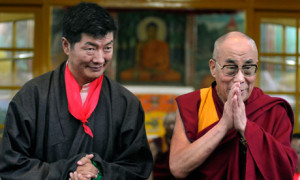One year after release from Chinese prison, Tibetan writer Tashi Rabten speaks

Tibetan writer Tashi Rabten
The Tibetan Center for Human Rights and Democracy (TCHRD) has translated an interview with Tashi Rabten, a young Tibetan writer who spent four years in prison for his writings after the 2008 Tibetan Uprising. The interview, which was originally published in Tibetan here, touches on his views now and his aspirations for the future:
You were a political prisoner of Tibet. What are your views about political prisoners?
Tashi Rabten: “Political prisoner” is a heavily loaded term. To be honest, I don’t understand politics. I was imprisoned for composing literary works. In other words, I was criminalized for expressing my views. Even during my trial, I told the judge that Tibetan writers should have an open space to express themselves. I still stand by this view. Whether in Tibet or anywhere else, if someone tells me to abandon my pen, I will never accept this. I might tolerate anything, but I don’t think I can tolerate if I were asked to cut any ties with Tibetan literature.
For the rest please see the original TCHRD post.
Sikyong Lobsang Sangay rebuts Beijing in TIME Magazine article

Sikyong Lobsang Sangay with His Holiness the Dalai Lama
Following claims by Chinese leaders that they hold the final say over the future of the Dalai Lama lineage, the elected leader of the Central Tibetan Administration has published an article in TIME addressing their claims. Noting that Party leaders slander the Dalai Lama and publicly insult him, Lobsang Sangay writes:
How incredible, then, that China now claims the right to locate the next reincarnation of the spiritual leader whom they call “the devil.” How incredible, too, that the Communist leaders whose ideology regards religion as the opium of the people, and whose founding figure, Mao Zedong, who famously told His Holiness the Dalai Lama in Beijing that “religion is poison,” now orders the Dalai Lama to reincarnate on the Chinese government’s terms.
To read the rest of his article, please click here.
17th Karmapa tours the United States

The 17th Karmapa (Image: Filip Wolak Photography)
Ogyen Trinley Dorje, the 17th Karmapa, has been giving a series of teachings and visiting universities while he travels across the US. His innovative and inspiring approach to Buddhism and life in the 21st century has drawn praise along the way, as in this Washington Post article which notes his forward-thinking stances on environmental sustainability and monastic ordination for women. For more information about the rest of the stops the Karmapa will make over the next month, please click here.
Celebrations quashed as Tibetan monk released from prison

Palden Gyatso (Image: RFA)
Palden Gyatso, a monk aged 46 living in Tibet’s Golog prefecture, has spent 6 years in prison after participating in a 2009 protest against Chinese rule. As he was released, Radio Free Asia reports that Chinese authorities explicitly ordered local Tibetans not to celebrate his release. This follows a series of high-profile incidents in which pictures and videos of Tibetans being received as heroes upon their release from Chinese prisons have made it to the outside world. For the rest of the story, please click here.

